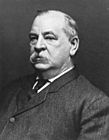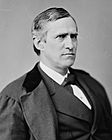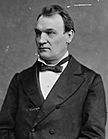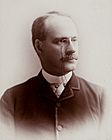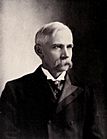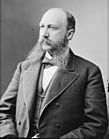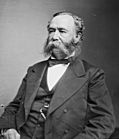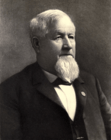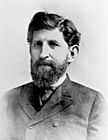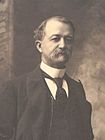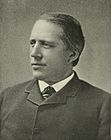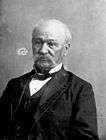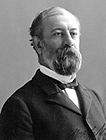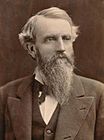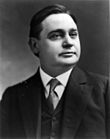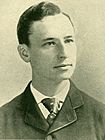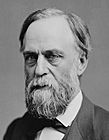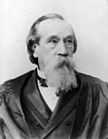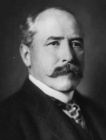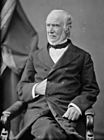Bourbon Democrat facts for kids
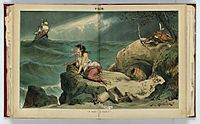
1884 cartoon illustrating the decline of the "Democrat Bourbonism" (represented as an empty jug) by Joseph Keppler
|
|
| Named after | Whiskey or French royals |
|---|---|
| Formation | 1872 |
| Dissolved | 1912 |
| Type | Political faction |
|
Key people
|
|
|
Parent organization
|
Democratic Party |
The Bourbon Democrats were a group within the Democratic Party in the late 1800s. They were active from about 1872 to 1904. These Democrats believed in conservative ideas and classical liberalism. This meant they often supported less government involvement in the economy.
They were known for backing presidential candidates like Grover Cleveland. He was president in the 1880s and 1890s. After 1904, the Bourbon Democrats slowly disappeared. Later, Woodrow Wilson became president in 1912. He worked with William Jennings Bryan, who was a big opponent of the Bourbons.
Bourbon Democrats believed in laissez-faire capitalism. This idea means the government should interfere very little with business. They were against high tariffs, which are taxes on imported goods. Republicans at the time usually supported these tariffs. Bourbons also believed in careful spending by the government.
They supported banks and railroads but didn't want the government to give them special help. They also opposed American imperialism, which is when a country tries to expand its power overseas. They strongly supported the gold standard for money. This meant that paper money would be backed by gold. They were against bimetallism, which would have used both gold and silver to back money. They wanted "hard" and "sound" money.
Bourbon Democrats also believed in states' rights. This means states should have more power than the federal government. They fought against political corruption. They supported reforms like the Pendleton Civil Service Reform Act. This law made government jobs based on merit, not on who you knew. They also fought against corrupt "city bosses" and groups like the Tweed Ring. Their fight against corruption even won them votes from some Republicans in 1884.
The name "Bourbon Democrats" was not chosen by the group themselves. It was often used by their critics. The term "Bourbon" came from bourbon whiskey, a drink from the South. It also referred to the Bourbon Dynasty in France. This royal family was seen as old-fashioned and unwilling to change. So, the name "Bourbon Democrats" suggested their views were outdated. It was not the name of a formal political group. No one ran for office as a "Bourbon Democrat." However, some smaller Democratic parties, like the Straight-Out Democratic Party (1872), shared similar ideas.
Contents
What Were the Bourbon Democrats?
The Meaning Behind the Name
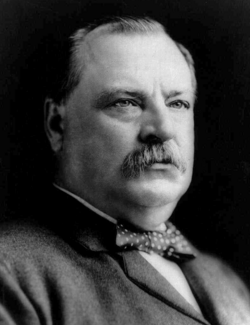
The nickname "Bourbon Democrat" was a clever play on words. It referred to bourbon whiskey, which was popular in Kentucky. More importantly, it hinted at the Bourbon Dynasty of France. This royal family ruled France for centuries. They were known for being very traditional and slow to accept new ideas.
A famous saying about the Bourbons was that they "have learnt nothing, and forgotten nothing." This meant they didn't learn from their mistakes or adapt to new times. During the period after the American Civil War, called Reconstruction, the term "Bourbon" suggested someone who was old-fashioned and out of touch. It was used to describe conservative Democrats who held onto older ideas.
The Gold Standard and William Jennings Bryan
A leading Bourbon Democrat, Grover Cleveland, became president twice. He won elections in 1884 and 1892. However, support for the Bourbon Democrats began to drop after a financial crisis in 1893. President Cleveland strongly believed in the gold standard. He refused to print more money backed by silver. This upset many farmers and common people in the Democratic Party. They wanted more money in circulation to help with debts.
At the 1896 Democratic National Convention, the party turned against Cleveland's policies. They favored using both gold and silver to back money (bimetallism). This was seen as a way to help the economy. William Jennings Bryan, a congressman from Nebraska, became a major opponent of the Bourbon Democrats. He gave a famous speech called the "Cross of Gold speech." He argued that the gold standard was hurting ordinary people. Bryan soon became the Democratic candidate for president in 1896.
Some Bourbon Democrats did not support Bryan. They either stayed out of the election or quietly supported William McKinley, the Republican candidate. Others formed a new party called the National Democratic Party. They were sometimes called "gold Democrats" because they supported the gold standard. Most of these "gold Democrats" eventually returned to the main Democratic Party by 1900 or 1904. Bryan continued to be a strong force in the party, winning the Democratic nomination again in 1900 and 1908. In 1904, another Bourbon Democrat, Alton B. Parker, won the nomination but lost the presidential election.
One of Cleveland's cabinet members, William Lyne Wilson, wrote in his diary about his opposition to Bryan. Wilson believed that special interests had too much control over Congress. He feared that using silver to back money would lead to unfair laws. He also thought it was wrong to call 50 cents a dollar. Wilson saw the Populist movement, which Bryan supported, as believing the government should make people rich.
The Decline of the Bourbon Democrats
In 1904, Alton B. Parker's nomination was a small win for the pro-gold Democrats. But it didn't last long. The old ideas of classical liberalism that the Bourbons believed in were losing their appeal. By the time of World War I, many key leaders of the movement had passed away. These included John M. Palmer, Simon Bolivar Buckner, and William F. Vilas. After the early 1890s, classical liberal ideas never again had such a strong influence on a major political party in the United States.
Bourbon Democrats in Different States
West Virginia
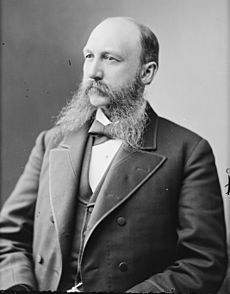
West Virginia became a state in 1863 during the Civil War. It was controlled by Republicans for a while. But in 1871, a law called the Flick Amendment was passed. This law gave more rights back to West Virginians who had supported the Confederacy. This helped the Democratic Party gain power. In 1877, Henry M. Mathews, a Bourbon Democrat, was elected governor. Bourbon Democrats held power in West Virginia until 1893.
Louisiana
In 1896, John Fitzpatrick, the mayor of New Orleans, left office after a scandal. He was a leader of the city's Bourbon Democratic group. His chosen replacement lost badly to a reform candidate. However, Fitzpatrick and his friends quickly formed a new group called the Choctaw Club. This club received a lot of support from Louisiana Governor Murphy Foster, who was Fitzpatrick's ally. Fitzpatrick helped make sure that new voting rules in Louisiana didn't stop immigrants from voting. These rules were designed to prevent black citizens from voting. In 1899, he helped another Bourbon candidate, Paul Capdevielle, win the mayoral election.
Mississippi
From 1877 to 1902, Mississippi was controlled by conservative white politicians. Their critics called them "Bourbons." These Bourbons were often planters, landowners, and merchants. They used various methods to control enough black votes to win elections and control the state government. Thomas C. Catchings, a Mississippi Democrat, served in the House of Representatives from 1885 to 1901. He was involved in the political debates during Grover Cleveland's presidency.
Catchings was a "gold bug," meaning he supported the gold standard. He defended President Cleveland against attacks from Mississippians who wanted silver money. These people were upset about Cleveland's actions, like repealing the Sherman Silver Purchase Act. Catchings remained a leader for sound money in Congress. He hoped that Mississippi Democrats would return to the conservative ideas of the original Bourbon Democrats.
Important Bourbon Democrats


